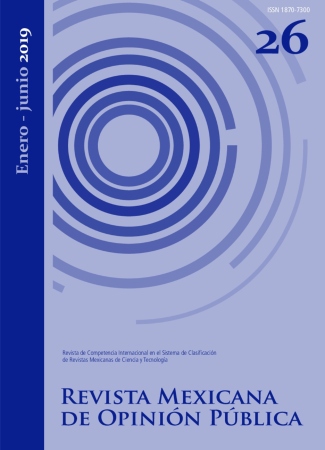The Party Identification in Mexico City. PRD and MORENA on July 1st, 2018
Main Article Content
Abstract
This article presents the explanatory variables of party identification with the National Regeneration Movement (MORENA) in Mexico City. Using a multivariate logistic model and data gathered by an exit poll realized in the country’s capital, by the Laboratory of Political Innovation, this work proves that the partisanship with morena doesn’t have neither emotional nor strictly ideological entailment, just as the original theoretical formulation suggest about party membership is based on. On the contrary, this article shows that the political identification with morena is a rational partisanship which is explained by the disapproval of the administration leaded by Miguel A. Mancera as head of Mexico City’s Government, the impact of Andrés Manuel López Obrador candidacy for presidency and the concrete benefits of social policies implemented during previous Partido de la Revolución Democrática’s goverments, such as pro-abortion postures, the recognition of same-sex marriage and the marijuana’s legalization, postures proper to left ideology. In this sense, it is shown that the characteristics that defined the partisanship for the Partido de la Revolución Democrática in Mexico City, such as left ideology and the concern about poverty, nowadays, are the constitutive elements proper to the political identification with MORENA.
Article Details
Citas en Dimensions Service
References
ÁLVAREZ, Lucía, “Las mudanzas de la izquierda”, en PÉREZ, Germán y LEÓN, Juan Carlos (coords.), El léxico de la política en la globalización. Nuevas realidades, viejos referentes, Universidad Nacional Autónoma de México-Porrúa, Distrito Federal, , México, 2008, pp. 309-317.
BELTRÁN, Ulises, “Factores de ponderación del voto retrospectivo”, Política y gobierno, vol. 7, núm. 2, Centro de Investigación y Docencia Económicas (CIDE), Distrito Federal, México, 2000, pp. 425-445.
BOBBIO, Norberto, El futuro de la democracia, Fondo de Cultura Económica, Distrito Federal, México, 1994.
BUENDÍA, Jorge, “El elector mexicano en los noventa: ¿un nuevo tipo de votante?”, Política y gobierno, vol. 7, núm. 2, Centro de Investigación y Docencia Económicas (CIDE), Distrito Federal, México, 2000, pp. 317-335.
CAMPBELL, Angus, CONVERSE, Philip, MILLER, Warren y STOKES, Donald, The American Voter, University of Chicago Press, Nueva York, EE. UU., 1960.
DAHL, Robert, La Poliarquía. Participación y oposición, REI, Ciudad de México, México, 1993.
DENZAU, Arthur y NORTH, Douglas, “Shared Mental Models. Ideologies and Institutions”, en LUPIA Arthur, MCCUBBINS, M. D. y POPKIN (eds.), S. L., Elements of Reason. Cognition, Choice and the Bounds of Rationality, Cambridge University Press, Cambridge, Reino Unido, 2000, pp. 23-46.
DORUSSEN, H. y TAYLOR, M., “Group Economic Voting – A Comparison of Netherlands and Germany”, en DORUSSEN, H. y TAYLOR, M. (eds.), Economic Voting, Routledge, Nueva York, EE. UU., 2002, pp. 92-121.
FEREJOHN, John, “Incumbent Performance and Electoral Control”, Public Choice, núm. 56, Springer, Utah, EE. UU., 1986, pp. 5-25.
FIORINA, Morris “An Outline of a Model of Party Choice”, American Journal of Political Science, núm. 3, Wiley, Washington, EE. UU., 1977, pp. 601-625.
FIORINA, Morris, “Economic Retrospective Voting in American National Elections: A Micro-Analysis”, American Journal of Political Science, vol. 22, núm. 2, Wiley, Washington, EE. UU., 1978, pp. 426-443.
FIORINA, Morris, “Voting Behavior”, en MUELLER, D. C. (ed.), Perspectives in Public Choice: A Handbook, Cambridge University Press, Cambridge, Reino Unido, 1997.
FIORINA, Morris, Retrospective Voting in American National Elections, Yale University Press, New Haven, EE. UU., 1981.
GOODHART, C. A. y BHANSALI, R. J., “Political Economy”, Political Studies, vol. 1, núm. 18, Political Studies Association, SAGE, Newcastle, Reino Unido, 1970, pp. 43-106.
HINICH, Melvin y MUNGER, Michael C., Ideology and the Theory of Political Choice, University of Chicago Press, Ann Arbor, EE. UU., 1994.
Instituto Nacional Electoral, “Instituto Nacional Electoral”, Instituto Nacional Electoral. Disponible en < https://www.ine.mx/>, [fecha de consulta: 8 de agosto, 2018].
KEY, V.O, “A Theory of Critical Elections”, The Journal of Politics, vol. 17, núm. 1, University of Chicago Press, Chicago, EE. UU., 1955, pp. 3-18.
KIEWIT, D. R. y RIVERS, D., “A Retrospective on Retrospective Voting”, Political Behavior, vol. 4, núm. 6, Kluwer Academic Publishers, EE. UU., 1985, pp. 369-393.
KITSCHELT, Herbert y WILKINSON, S., Patrons, Clients, and Policies. Patterns of Democratic Accountability and Political Competition, Cambridge University Press, Cambridge, Reino Unido, 2007.
KRAMER, G. H., “Short-Term Fluctuations in U.S. Voting Behavior, 1986-1964”, American Political Science Review, núm. 65, Cambridge University Press, Cambridge, Reino Unido, 1971, pp. 131-143.
LEWIS-BECK, M. y P. BELLUCCI, “Economic Influences on Legislative Elections in Multiparty Systems: France and Italy”, Political Behavior, núm. 4, Kluwer Academic Publishers, Iowa, EE. UU., 1982, pp. 93 -107.
MUELLER, J. E., “The Presidential Popularity from Truman to Johnson”, American Political Science Review, núm. 64, Cambridge University Press, Cambridge, Reino Unido, 1970, pp. 18-39.
PARAMIO, Ludolfo, Sin confianza no hay democracia: electores e identidades política, Instituto de Estudios Sociales Avanzados (CSIC), España, p. 30.
POIRÉ, Alejandro, “Retrospective Voting, Partisanship, and Loyalty in Presidential Elections: 1994”, en DOMÍNGUEZ, J. I. y POIRÉ, A. (eds.), Toward Mexico’s Democratization, Routledge, Nueva York, EE. UU., 1999, pp. 24-57.
PRZEWORSKI, Adam, STOKES, Susan y MANIN, Bernard (eds.), Democracy, Accountability, and Representation, Cambridge University Press, Cambridge, Reino Unido, 1999.
SÁNCHEZ Y SÁNCHEZ, Carlos Luis, Identidad partidista y clientelismo en la Ciudad de México: 2001–2006, Universidad Nacional Autónoma de México-Instituto de Investigaciones Sociales, Ciudad de México, México, 2016.
Secretaría de Desarrollo Social de la Ciudad de México, “Secretaría de Desarrollo Social de la Ciudad de México”, Secretaría de Desarrollo Social de la Ciudad de México. Disponible en https://www.sds.cdmx.gob.mx/, [fecha de consulta: 8 de agosto, 2018].
STIGLER, G. J., “General Economic Conditions and Natural Elections”, American Economic Review, núm. 63, American Economic Association Publications, Pittsburgh, EE. UU., 1973, pp. 160-167.
TUFFE, E. R. Political Control of the Economy, Princeton University Press, Princeton, EE. UU., 1978.
WEATHERFORD, S., “Economic Conditions and Electoral Outcomes: Class Differences in the Political Response to Recession”, American Journal of Political Science, vol. 22, núm. 4, 1978, Wiley, Washington, EE. UU., pp. 917-938.

Revista Mexicana de Opinión Pública por Universidad Nacional Autónoma de México se distribuye bajo una Licencia Creative Commons Atribución-NoComercial-SinDerivar 4.0 Internacional.
Basada en una obra en http://revistas.unam.mx/index.php/rmop.




